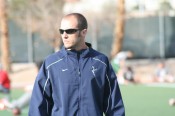One of the most common questions that I get asked is, “What is the difference between a scholarship, a preferred walk on, and a walk on athlete?” It is also the most misunderstood statement from coach to family when it comes to the proposed scenarios. I have written blogs and tweeted on this topic several times. No matter how often I do so, unfortunately, my point will probably never be understood….until after the fact. I speak on behalf of experience. If you want honesty, here it is in it’s briefest form.
Scholarship = No Risk….. at least for 1 semester
Preferred Walk on = High Risk…. but at least you are on the team and in school
Walk on = Try out…. they really don’t want you and probably won’t help you get into school
There are little to zero guarantees when it comes to the opportunity to play college football. I cannot stress enough that football WILL get you into a college / university that you would not have otherwise gotten into on academics alone. And, WHEN you take advantage of this opportunity, you will graduate and have a degree that will last for the rest of your life. So, no matter what, you win, if you are smart and understand that all of this is about education, not football.
Scholarship Specialist
If you truly want to PLAY college football, a scholarship will guarantee you an opportunity to see the field. Not only will you be awarded financial aid, but you will be given the opportunity to win the job. The job is yours to lose. When a school makes an investment in you, they want to see the investment pay off. College coaches have big egos. They want to look good when it comes to proving that they made great investments.
Advantages
When you walk onto campus you will have the respect of your teammates and coaches from Day 1. Coming in on scholarship is a huge confidence booster.
School is paid for (from a partial to full scholarship depending on the level and individual school). Every penny counts. Talk to graduates who had / have student loans (Rubio – [email protected]).
Scholarships are renewable at each quarter/semester. Most coaches will honor that renewal based on your character and academic performance, not your athletic performance. Most coaches get it. Most coaches have a family and kids as well. They will honor the promise made to you. It is rare that a scholarship is not seen all the way through to graduation unless you fail in the classroom or off the field. In short… be smart and the degree is yours for free or at a discounted price.
You will have every opportunity to see the field. If you are as good as or even slightly inferior to a walk on, you will play. Coaches want to see their investment pay off. Alumni want to see the athletes with “A NAME”.
Disadvantages
None
Preferred Walk On Specialist
Every coach in America will make this option seem like the best option on earth. Why? Because they get you for FREE (It is like being hired as an intern vs. being hired as the CEO). 13 years ago when I started my business this is all that kickers, punters, and long snappers were worth. That is why I started my business. From approximately 5 D1 scholarships in 1995 to 60+ per year (Low estimate) in 2013. www.ChrisSailerKicking.com
Things have changed. I changed them. Yes, I will take credit. Vegas, the first ever REAL kicker/punter rankings, and the introduction to long snapping as a position (Rubio – [email protected]) have forever changed the way that specialists are treated. To accept a preferred walk on over a scholarship is like warping back in time. You are taking a HUGE risk.
Advantages
None
Disadvantages
If I had the space and time I could write you a 200 page novel filled with just quotes from specialists and their parents with complaints about the LIES and unfulfilled promises that a college coach told them and/or made to them. They are not lying, they are recruiting.
The day you walk on campus, you are 2nd, 3rd, 4th, or 5th string. Everything that the coach promised you goes out the window. He may not even say hello to you as you walk by.
You have to put in your time and EARN the respect of your teammates and coaches.
You have to be much better than (not equal to or even better than) the scholarship athlete that the coach invested in.
Regarding the timeline that you were promised – Add 2 years to it on average. Be ready to pay for your education.
Walk On Specialist
This option is nearly non existent in todays day and age. With the introduction to the internet and 3rd party evaluations (Sailer / Rubio) a walk on is basically a thing of the past. This means the coach will allow you to try out for the team. He is basically telling you that you are not good enough. He is trying to end the communication and get you off the phone. This works out hardly ever. No need to go into the advantages and disadvantages. Is it possible to make a team this way…yes. It is likely…no.
This blog is not intended to scare you. It is intended to help you understand that recruiting is exactly that. Don’t believe everything that you hear. Each family is different. Each situation is different. I have 4 young children (12, 10, 7, and 5). If they are fortunate enough to become athletes, I am fortunate enough to understand recruiting based on my experiences with thousands of athletes and their families. Based on what you are looking for, heed my advice and make YOUR choice. And remember in the end its about that degree. So no matter what, you will win.
Percentages (My estimate)
Scholarship Specialist: 400 out of 500 see the field
Preferred Walk On Specialist: 100 out of 500 see the field
Walk On: 5 out of 100 make the team
College Degree: 100% up to you no matter how you are recruited. Once you are in, you are in.
There are many success stories of walk ons and preferred walk ons enjoying success (Your recruiting coach will tell you every one of them). But for every success story there are 10 stories of failure (Your recruiting coach will not tell you these stories).
One final thought.
Chris Sailer: UCLA, Cut by the San Francisco 49ers
Adam Vinatieri: South Dakota State, NFL All-Pro
The path you choose is up to you. Depending on what you are looking for and what your ultimate goals are, take the content of this blog into consideration before making your college choice.
(515)









I realize this is an older blog post, but I have to comment and wholeheartedly agree with Mr. Sailer and his comments regarding Scholarships and Walk-Ons. My son went as a preferred walk-on to a D1 school and it was probably the most frustrating experience of his young life. The coaches broke promise after promise in the recruiting process (and they have every right to) and treated my son like he was lesser than the other players in just about every scenario, year-after-year, when he was, in fact, better than the scholarship kicker.
In live drills, my son would frequently make 5 of 7 FGs to the scholarship kickers 4 of 8 field goals and it was always be the scholarship guy getting the nod week after week (we have most of these drills on video to prove it).
Not to mention he was hitting the ball 3 yards further on kickoffs, but the distance wasn’t substantial enough to give my son a look in a game.
Then there was all the other small jabs (leaving him out of the media guide, switching his number twice, not allowing him to attend travel team pre-game meals for home games, sometimes leaving him off the depth chart entirely even though he was second string, and being completely ignored by the special teams coach).
To make matters worse, the scholarship player’s father played for the school in the 80’s and his uncles were boosters, so it was just a no-win situation for him.
Finally, the scholarship kicker’s FG percentage was barely above 60%. They just did not want to give the job to anyone else no matter how many he missed.
It was never a fair battle, and my son got completely disillusioned and sad with the whole experience. He eventually left his junior year, graduated early, and got a job.
The only thing that we take solace in, and I realize this sounds low of us, is that the coach was fired the next year after the team failed to break .500 for the third straight year. My son is a hardened but a better person for the experience as well. He learned valuable lessons in this and he was able to translate these experiences into positives in adulthood.
My advice to parents of future student athletes:
1. Attend lots of competitive camps. It’s ok if they are not the best. Get them kicking in front of a lot of people so they can deal with the pressure.
2. Train hard. Kicking is not the only thing that will make them a great kicker. They need plyometric drills, resistance training, speed work. D1 coaches think heavy squatting and dead lifts make you a stronger kicker. There is absolutely zero truth to this. Think fast leg, not strong leg.
3. Sit down with your son and ask him what schools he’d love to attend AS A STUDENT. If he suffers an injury and can’t play football, or if the coach decides to cut him, will he be happy as just a student and not an athlete? This is a VERY important decision and not to be taken lightly.
We have fond memories of watching him play, and we are happy what he was able to accomplish regardless of the circumstances. Best of luck to all of the student-athletes and parents out there.